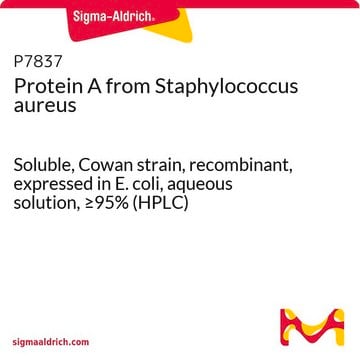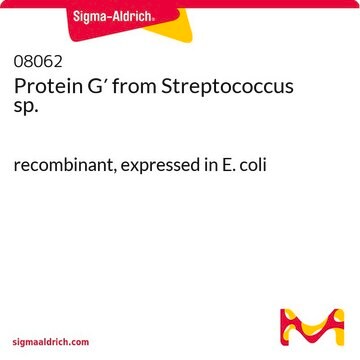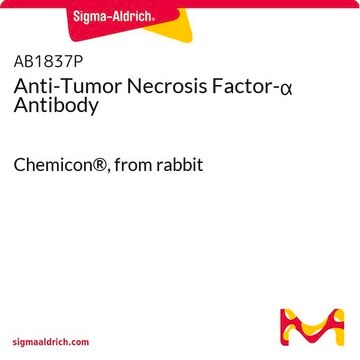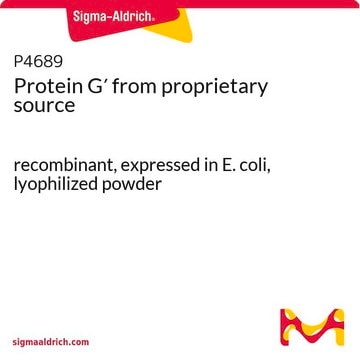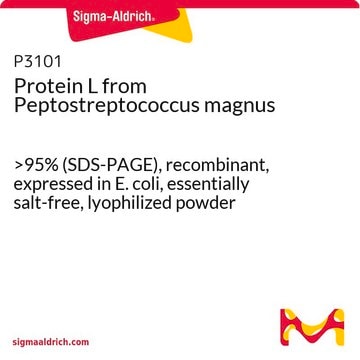539202
Protein A, Staphylococcus aureus
Se connecterpour consulter vos tarifs contractuels et ceux de votre entreprise/organisme
About This Item
Code UNSPSC :
41116133
Nomenclature NACRES :
NA.41
Produits recommandés
Forme
lyophilized solid
Niveau de qualité
Fabricant/nom de marque
Calbiochem®
Conditions de stockage
OK to freeze
Solubilité
water: soluble
Conditions d'expédition
ambient
Température de stockage
−20°C
Description générale
Native protein A from Staphylococcus aureus. Provides a versatile and economical means for isolating, detecting, and purifying antibodies. It is especially useful in immunohistochemical studies because, unlike secondary antibodies, it does not bind to cell Fc receptors and, therefore, will not give high background reactions. Strongly reactive with guinea pig; human IgG1, IgG2, and IgG4; mouse IgG2b, and rabbit. Weakly reactive with bovine; human IgA, IgE, and IgM; and mouse IgG3. Nonreactive with goat; horse; human IgD and IgG3; rat; mouse IgG1; and sheep.
Avertissement
Toxicity: Standard Handling (A)
Reconstitution
Following initial thaw, aliquot and freeze (-20°C). Stock solutions are stable for up to 3 months at -20°C.
Autres remarques
Sjødahl, J. 1976. FEBS Lett.67, 1976.
Informations légales
CALBIOCHEM is a registered trademark of Merck KGaA, Darmstadt, Germany
Code de la classe de stockage
11 - Combustible Solids
Classe de danger pour l'eau (WGK)
WGK 1
Point d'éclair (°F)
Not applicable
Point d'éclair (°C)
Not applicable
Certificats d'analyse (COA)
Recherchez un Certificats d'analyse (COA) en saisissant le numéro de lot du produit. Les numéros de lot figurent sur l'étiquette du produit après les mots "Lot" ou "Batch".
Déjà en possession de ce produit ?
Retrouvez la documentation relative aux produits que vous avez récemment achetés dans la Bibliothèque de documents.
Michael P Schwartz et al.
Analytical chemistry, 79(1), 327-334 (2006-12-30)
Determination of kinetic and thermodynamic protein binding constants using interferometry from a porous Si Fabry-Perot layer is presented. A protein A capture probe is adsorbed within the pores of an oxidized porous Si matrix, and binding of immunoglobulin G (IgG)
Gerard J Nau et al.
Proceedings of the National Academy of Sciences of the United States of America, 99(3), 1503-1508 (2002-01-24)
Understanding the response of innate immune cells to pathogens may provide insights to host defenses and the tactics used by pathogens to circumvent these defenses. We used DNA microarrays to explore the responses of human macrophages to a variety of
Eniko Farkas et al.
Biosensors, 12(2) (2022-02-25)
Bacteria repellent surfaces and antibody-based coatings for bacterial assays have shown a growing demand in the field of biosensors, and have crucial importance in the design of biomedical devices. However, in-depth investigations and comparisons of possible solutions are still missing.
Viktoria Rungelrath et al.
Microbiology spectrum, 9(2), e0088821-e0088821 (2021-10-28)
Staphylococcus aureus is an important human pathogen that can cause a variety of diseases ranging from mild superficial skin infections to life-threatening conditions like necrotizing pneumonia, endocarditis, and septicemia. Polymorphonuclear leukocytes (PMNs; neutrophils in particular herein) are essential for host
Ronan M Kelly et al.
Biotechnology and bioengineering, 115(3), 705-718 (2017-11-19)
Cross-linking of the Fcγ receptors expressed on the surface of hematopoietic cells by IgG immune complexes triggers the activation of key immune effector mechanisms, including antibody-dependent cell mediated cytotoxicity (ADCC). A conserved N-glycan positioned at the N-terminal region of the
Notre équipe de scientifiques dispose d'une expérience dans tous les secteurs de la recherche, notamment en sciences de la vie, science des matériaux, synthèse chimique, chromatographie, analyse et dans de nombreux autres domaines..
Contacter notre Service technique
